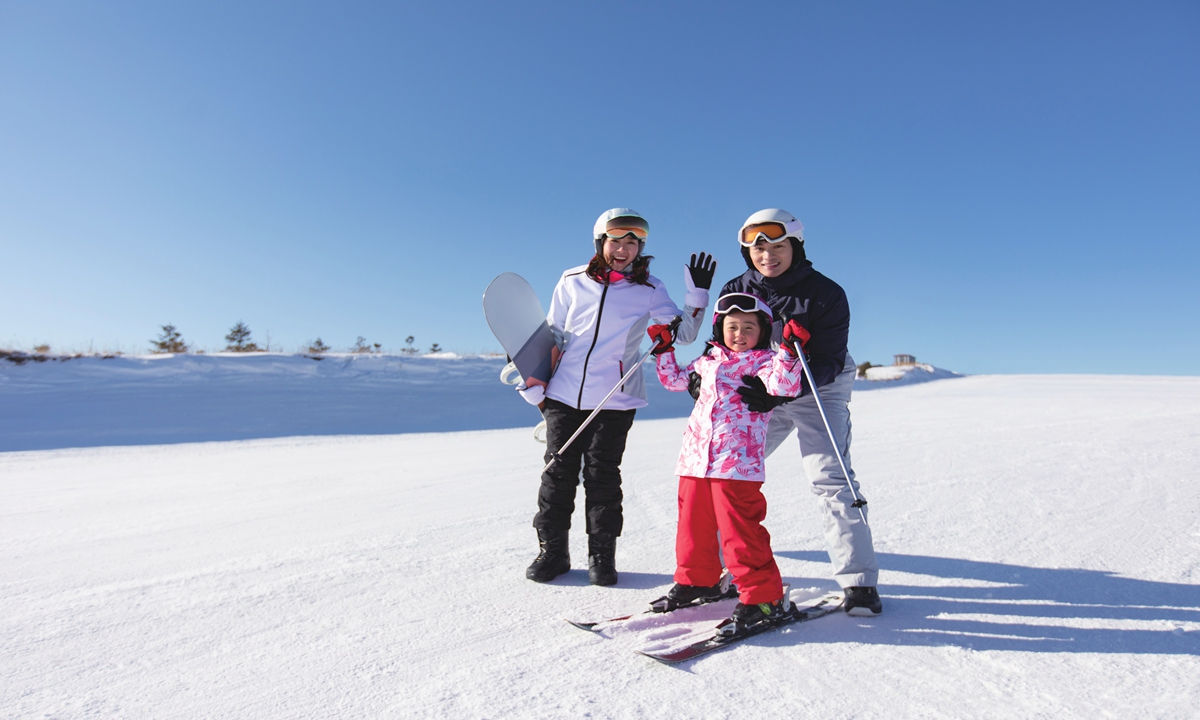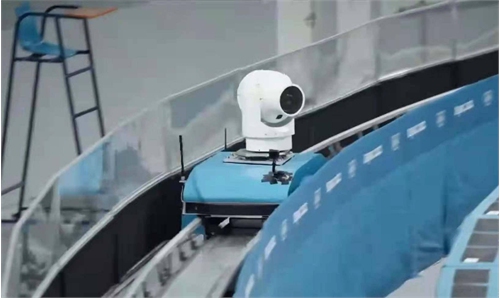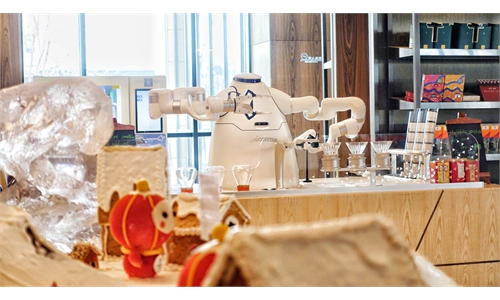
Young parents are teaching their daughter to ski at a ski resort in Zhangjiakou, North China's Hebei Province. Photo: VCG
The curtains of the Beijing 2022 Winter Olympic Games pulled down in late February, which has sown seeds in the minds of hundreds of millions of people across China, especially among young people, who are rushing to ice rinks and ski slopes with unparalleled enthusiasm to practice hard, in the hope that one day they will "fly" like an Olympian."Over the weekend, you might have to wait some 40 minutes before you can enter the ice rink. Sometimes, when your turn comes, you might find no skating shoes of appropriate size," a Beijing-based enthusiast surnamed Wang told the Global Times on Monday, recalling his pre-skating experience at a "Champion Rink" branded venue in Beijing.
"But when I finally got my shoes and skated on the ice, I felt like I was flying and it is an alluring sport event especially after you have watched the Olympics held in our homeland," the 27-year-old said.
A service person from the ice rink told the Global Times that skiing coaches are in short supply now. "Waiting periods extend to two weeks for private lessons," the person said.
For a beginner to learn skiing and skating, 10 lessons are often needed before grasping basic skating skills, with private lessons often costing 180 yuan ($28.5) per session, she added.
Growing market demand
With the Beijing 2022 Winter Olympics acting as a catalyst, children in China have gained greater access to ice and snow venues Figure skating has exploded in popularity inspired by the likes of internationally renowned skaters like Japanese two-time Olympic champion Yuzuru Hanyu, who has received more than 20,000 letters from Chinese fans and warm welcomes from volunteers during the Games.
The Beijing Uniterra Skating Club, which offers both figure skating and ice hockey classes or training camps, has witnessed the number of inquiries grow up by nine times since the opening of the Winter Olympics on February 4.
"Even though the Games has finished, the inquiries are still three to five times the number of the pre-Games level," a representative of the club's new chain in Yizhuang, Daxing district in southern Beijing told the Global Times on Monday.
In response to surging market demand, the club has increased its number of coaches to around 20 from previous 12.
The representative said many parents remain with their children during tutoring, and it is often the case that children have pushed to sign up for the sports activity, rather than being forced to do so by their parents.
From fees, custom-made costumes and skates, to the cost of gaining qualifications and participating in competitions, the cost of being involved in the sport can put some families off.
Yu Fei, CEO of Uniterra Skating Club, told the Global Times that the high cost of figure skating is inseparable from the investment in ice rinks. "Ice rinks are an assets-heavy, cash-intensive industry, which requires continuous investment, and the cost of venues and coaching account for the bulk of the costs."
The infrastructure investment in a new ice rink is around 10 million yuan, according to media reports. Since most commercial ice rinks are indoors, they need off-season ice making both in winter and summer. The electricity bill for a standard ice rink is as high as two million yuan a year, making it a quite long period before an rink can reach the break-even point.
"At present, there are two main factors restricting the development of ice rinks, also making it expensive. Venues are extremely scarce, and it is difficult to find appropriate sports education sites in cities. Furthermore, the growth rate of coaches is far behind market demand," Yu said.
In 2015, China set a goal of engaging 300 million people in winter sports when Beijing won the Olympic bid. Since then, a boom in the construction of winter sports infrastructure is seen.
Officials from the General Administration of Sport of China said by the beginning of 2021, China has built 654 standard ice rinks, up 317 percent compared with 2015; and 803 indoor and outdoor ski resorts, up 41 percent from 2015's level. China is researching building more ice rinks and mobile ice rinks. The standards for building mobile ice rinks will be published by the end of 2022.
Rising investment
Despite the rapid growth rate, the number of standard ice rinks is still scarce in each city on average. Especially in southern China, there is currently no city with more than 10 ice rinks.
Uniterra Skating Club plans to explore new markets in the south including Shanghai, Hangzhou, capital of East China's Zhejiang Province, and Southwest China's Chongqing Municipality.
The three cities have great market potential and only a handful of ice rinks. There are 50 ice training venues in Beijing, and the market space is saturated. The future of ice training lies in the south, according to Yu.
"If the new high technologies applied during the Beijing Winter Olympics could be popularized for commercial use, ice rinks' energy consumption, operation and maintenance costs are expected to drop. And more ice rinks are set to flourish in the country's south, which will promote the expansion of figure skating in the country," she added.
"With the truly exceptional Olympic Winter Games Beijing 2022, we welcome China as a winter sport country," said Thomas Bach, president of the International Olympic Committee (IOC) while addressing the closing ceremony.
China will vigorously develop ice and snow tourism and consumption, and promote the implementation of the action plan for the development of ice and snow tourism, an official with the National Development and Reform Commission, the country's top economic planner, told a press conference on Monday.
During the Spring Festival holidays which overlapped with the sports event, the Beijing Winter Olympic Games spurred a wave of spending on winter sports.
According to figures from China's online tourism platform Trip.com, the booking volume of ski-themed hotels increased 54 percent last year, while ticket orders for resorts related to ice and snow increased 40 percent.
Around 323.3 billion yuan ($51 billion) is set to be generated from tourism-related revenue in the ice and snow sports in 2021-2022, data from a winter sport tourism report by the China Tourism Academy revealed in January.


